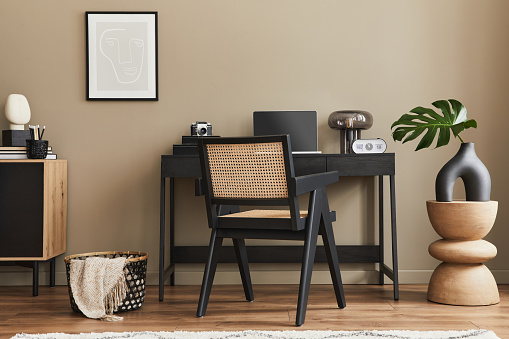Gone are the days when having a home office was a luxury for the wealthy. Nowadays, when people search for a new home, they’re not only after the basics like bedrooms, baths, and a kitchen. They also want a quiet space where they can focus, work, and store essential documents.
Thus, as a property owner, you might ask yourself, is it worth building a home office in your rental? What are the benefits of investing in such a space? Stick around till the end of this article to get all the answers you need.
Does your Rental Need a Home Office?
Before making any significant changes to your property, it’s vital to ask yourself if the changes are worth it. Here are reasons your rental needs a home office:
-
Remote Work is on the Rise
Since the pandemic, more people have been forced to take up remote or hybrid work. That increases the need for workers to have a dedicated space at home to work and study.
-
Work-Life Balance
Experts recommend that people working from home avoid using the same space for unrelated tasks. Thus, that increases the need for people to find a quiet area separate from the rest of the house to get their work done.
-
Resale Value
Since home offices are gaining more popularity, properties with such space are in high demand. That can significantly boost your resale value if you ever decide to sell, especially if you have lovely furnishings and fixtures. It would help if you discuss ideas with your rental home property managers.
Pros and Cons of Adding Home Office
Pros
- Attractive to Tenants
One of the most significant advantages of creating a home office is that it is attractive to tenants. In the modern world, more people work from home than ever, especially in the post-COVID era. More professionals are even migrating to the suburbs because they can afford to go completely remote. For such tenants, a home office that allows them to separate their personal and work life under the same roof is ideal. With the addition of a home office, your property could become highly sought after by well-paying tenants.
- Higher Rental Returns
According to the laws of demand and supply, an increase in demand often follows a price increase. Since we’re still amidst a housing crisis, properties with added advantages such as a home office are in high demand. Property owners can thus charge more for their rentals and earn more income.
- Mixed-Use Property
Even if your tenant isn’t keen on having office space, you can always rent it out to someone else. As long as the office has an exterior door, so people coming and going don’t have to pass the front door, it could work. However, you need to check whether you can rent your office separately as a commercial space. If local zoning laws prevent you from operating a mixed-use property, you’ll have to forego this idea.
Cons
- Initial Upfront Costs
If you’re building a home office from scratch, it could be costly. You’ll have to budget expenses like breaking walls, installing plumbing, wiring, painting, and more. While you can afford to increase your rental rates after the completion of the project, it’ll still cost you a pretty penny. More so, if you don’t plan for it well, you could end up spending more money than you initially budgeted.
- Extra Maintenance Costs
An extra room means extra maintenance costs for the landlord. The more square meters you have, the more property damage you risk. Although you can usually offset the risk by charging a higher security deposit, you’ll still be the first point of contact when something goes wrong.
- Variable Value
Although having a home office is attractive to many tenants, not everyone sees it as a necessity. Some renters would rather have an extra bedroom or exercise room. You can still convince them to swap the furniture in such a scenario. However, if the tenant doesn’t need the extra space, it could be challenging to convince them to fork out more than they budgeted.
How to Create a Home Office on a Budget
-
Repurpose Old Furniture
Reusing old furniture is one of the easiest ways to create a home office on a budget. However, that doesn’t mean you should pull odd, worn-down furnishings from every house corner. You can go bargain hunting for fairly used pieces that are still attractive.
Get complementary furniture if you’re carving your office space out of an existing area. After all, you still want that corner to have aesthetic appeal. Since tenants would need that area to concentrate, it would be best to invest in a room divider. A thick drape or folding screen can create the barrier you need.
-
Buy New Fixtures
To create a modern office, you must be willing to splurge on some items. You could easily repurpose a plastic or wooden chair, but investing in an ergonomic chair would be best. Tenants that work long hours would appreciate the extra lumbar support, especially if they’re at their desks all day.
Additionally, you can purchase a few accessories like paintings or a yoga ball. These pieces give the room more character, making it a cozy workplace.
-
Optimize the Lighting
Optimal lighting is an essential requirement in every room, especially the office. IT’s always best to position the table or workspace near a natural light source. A mirror can help with more illumination for a bigger space since it reflects light. Of course, remember to make plans for artificial lighting. You can use a combination of floor and desk lamps for a more expansive glow. LED bulbs are also great because they have a longer lifespan and are affordable.
-
Include Storage Space
Make room for storage in your office, so your tenants can always stay organized. You can invest in a shelf that allows you to store other items like frames in addition to books and papers. Also, you can include side cabinets or get a table that already has one in-built. If you have some cash to spare, you can create more storage space by getting a magazine rack, file tray, or baskets.
Conclusion
As a landlord asking, is it worth it to build a home office in your rental? You must weigh the pros and cons of adding that extra space. A quiet area in your home plan could attract more tenants and boost rental returns. On the other hand, it requires capital for building and furnishing, which would increase your overall maintenance expenses. If you want to maximize your property’s potential while curbing costs, you can always contact a professional property management company to help.







